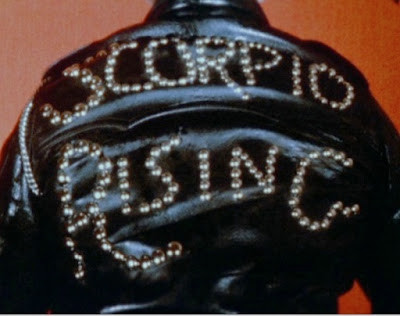Kenneth Anger’s 1964 film, Scorpio Rising, remains a cult classic, decades after its release. If you’ve preconceived notions about what a “gay biker film” might entail, prepare to have them challenged and expanded by this avant-garde piece. To call Scorpio Rising simply a “gay Nazi biker film,” as some might, is to drastically undersell its complexity and artistic merit. This is not your typical narrative; in fact, it’s arguably quite unlike anything that preceded it, and its influence continues to resonate in cinema today. While understanding Scorpio Rising can be a journey, its impact on filmmaking and its exploration of homoerotic themes within biker culture are undeniable.
Scorpio Rising is best described as a homoerotic short film centered around biker culture. The film is visually rich, featuring striking imagery of leather-clad men, religious iconography juxtaposed with Nazi symbols, and a pervasive homoerotic atmosphere. Notably, the film is devoid of dialogue. Instead, Anger masterfully employs popular songs from the 1950s and early 60s, carefully selected to underscore and comment on the visuals unfolding on screen. We see bikers engaged in everyday activities: working on their motorcycles, meticulously dressing in leather gear, smoking, taking drugs, casually reading comics, riding in formation, and engaging in initiation rituals for new members. While these actions form the surface narrative, the film’s true depth lies beneath.

A still from Scorpio Rising showcasing the film’s homoerotic biker aesthetic and use of leather imagery.
However, to watch Scorpio Rising expecting a straightforward plot or scintillating dialogue is to miss the point entirely. Its significance lies not in conventional storytelling, but in its profound and lasting influence on the language of cinema. This “gay biker” film, as it might be broadly categorized, has had an undeniable and transformative impact on filmmaking since its debut in 1964. Kenneth Anger was a pioneer in several groundbreaking cinematic techniques. He is widely recognized as one of the first filmmakers to effectively integrate pre-existing, popular music into his films, rather than relying solely on original scores—a technique that has become commonplace today. Furthermore, his innovative use of rapid editing and intercutting, even incorporating fragments of other films, created a visually dynamic and intellectually stimulating viewing experience.
As Scorpio Rising progresses, the editing becomes increasingly rapid and fragmented, mirroring the film’s escalating intensity and challenging the viewer’s perception. While Anger’s filmography often explores themes of sexuality and the occult, and Scorpio Rising certainly flirts with softcore elements, reducing it to mere pornography would be a gross oversimplification. Scenes depicting men dressing in leather gear and the infamous biker initiation scene involving mustard are undeniably charged with homoerotic tension. Legend has it that Anger himself considered the film to be a form of “masturbatory fuel,” highlighting the film’s overt and subversive exploration of male desire.
Regardless of the veracity of this legend, the images of bikers donning their leather attire in Scorpio Rising continue to resonate powerfully in contemporary visual culture. Every time we witness heroes or groups preparing for action, from cult classics like Army of Darkness to the more stylized superhero films, we are seeing echoes of Kenneth Anger’s pioneering vision. While directors may cite various sources of inspiration, the underlying visual language often traces back to Anger’s groundbreaking work. He, perhaps unintentionally, codified the “gearing up for battle” montage, a cinematic trope that is now ubiquitous.
Scorpio Rising is not always an easy film to watch. Its non-linear narrative, rapid editing, and symbolic imagery demand active engagement from the viewer. It is not disturbing in a conventional sense, but its challenging and unconventional style can be initially disorienting. While it may not be a film that everyone will “love” in a traditional sense, it undoubtedly offers a rewarding and thought-provoking cinematic experience. It is a film that invites multiple viewings and interpretations, and it is highly likely that each viewing will reveal new layers of meaning and nuance. Scorpio Rising is a film that rewards deeper analysis and appreciation.
Why watch Scorpio Rising: For its profound influence on cinema and its groundbreaking exploration of homoeroticism within biker subculture.
Why not watch Scorpio Rising: If you prefer straightforward narratives or are uncomfortable with homoerotic themes and avant-garde filmmaking styles.
